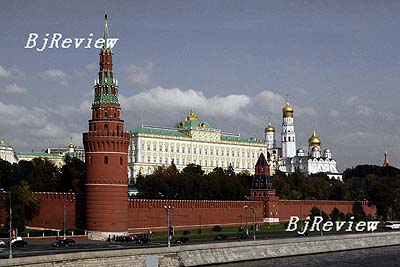|

In early October, Russian President Vladimir Putin announced he would lead the United Russia party during the coming parliamentary elections scheduled for December, and he might seek the premiership as the party's top candidate after his second presidential term ends.
Russian observers foresaw that Putin would not leave the political stage like Boris Yeltsin did. They believed that Putin would serve as prime minister or return to the post of president after bypassing term limitations set by the Russian Constitution. Although Putin will end his two presidential terms, Russians are still confident about his performance because of his leadership capability and political experience.
Putin's intentions
United Russia party Chairman Boris Gryzlov, who is also chairman of Russia's Duma, issued a report entitled "Putin's Plan" on October 1 at the party's meeting. He noted that 2007 and 2008 would be an important period for Russia and that the party would participate in the legislative and presidential elections.
The United Russia party is the political backbone of Putin's administration, but Putin is neither its leader nor a member. There are various versions of Russia's political situation in the coming post-Putin era. Putin strongly opposes amending the constitution to extend the time limit that presidents can serve. But he also said that a five-year president term would be perfect, because he thinks that a four-year term is too short, and a seven-year term is too long.
Putin accepted Prime Minister Mikhail Fradkov's resignation on September 12 and dismissed the government. On the same day, he nominated Viktor Zubkov, the former head of the Federal Financial Monitoring Service, as the new prime minister. Since then, observers have considered Zubkov as Putin's chosen successor.
Sixty-three-year-old Zubkov worked well at his post at the Federal Financial Monitoring Service, which collects and analyzes information on potentially fraudulent fiscal operations. Moreover, he also showed a firm hand as prime minister after taking the position. It is hard to predict whether or not Zubkov can complete one term if he wins the presidential election next year, because of his age. But during his presidential term, he might push for revising the constitution and extending the presidential term to five or seven years. In this manner, he could pave the way for Putin's return as president.
The United Russia party believes that continuing Putin's political strategy is a precondition for maintaining Russia's development. And observers believe that the United Russia party will win the Duma elections in December and dominate parliament.
Since the party won the last Duma elections in 2003, Russia has been politically stable and has had a rapidly developing economy. And most Russian voters have confidence in the party, because it supports Putin as its top candidate.
It is quite possible that Putin could take the post of prime minister. According to Russia's constitution, the president nominates the prime minister. As long as Putin is willing to be prime minister, the future president will nominate him. Thus, if Putin submits his cabinet list to the Duma, which the United Russia party would control, his list would easily be approved.
As the top candidate of the United Russia party, Putin showed that he would lead both the party and the party's councilor group in the Duma. Putin's strategy has been the party's guiding mantra. Since Russia has adopted a multiparty system, some political forces have opposed Putin's reappointment and worry it might lead to despotism. However, strong-willed leaders have always been popular in Russia.
Putin was appointed as prime minister in 1999, after Yeltsin nominated him. During his premiership, he commanded and then won the second Chechnya War that year, through which he earned his people's trust. In March 2000, Putin beat other competitors during the early-scheduled presidential election. He dealt with domestic and foreign affairs very cautiously. He won Russians' hearts by first striking at financial oligarchy groups that meddled in Russia's domestic affairs. He approved Russia's Party Law and pushed forward the country's multiparty system. Putin also established his own party basis by helping to create the United Russia party. The party controlled the parliament through the Duma elections in 2003. Since then Russia's political situation has been stable, because the president, legislature and the government have been cooperating smoothly.
Putin also took measures to continue privatizing Russia's economic structure, but he also made sure that the state still controlled crucial industries and state-owned enterprises. Rocketing international oil prices brought huge profits to Russia, a big oil and natural gas exporter. The country not only paid off its debts to the Paris Club, a group of rich countries that provides financial services to indebted countries, but also set up foundations inside Russia.
| 